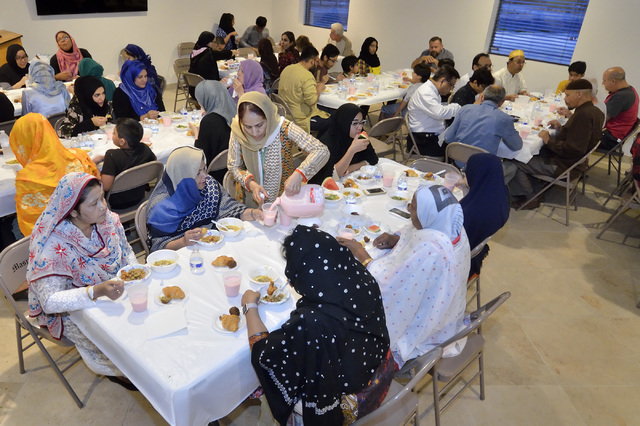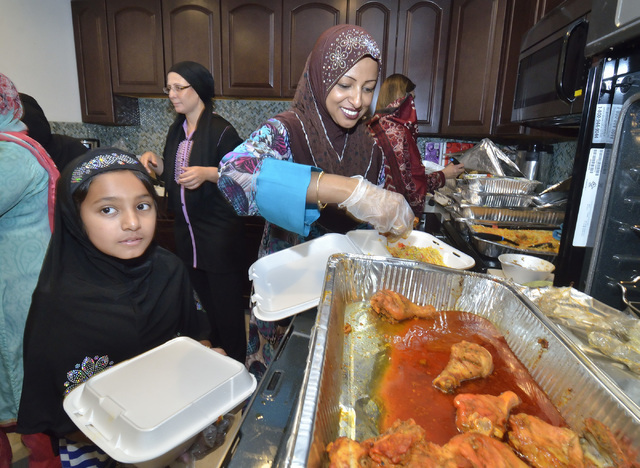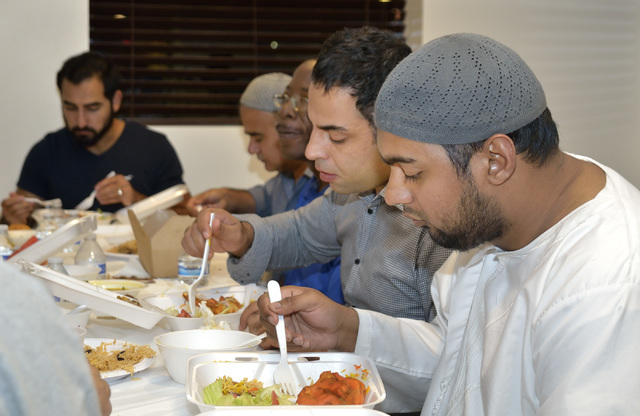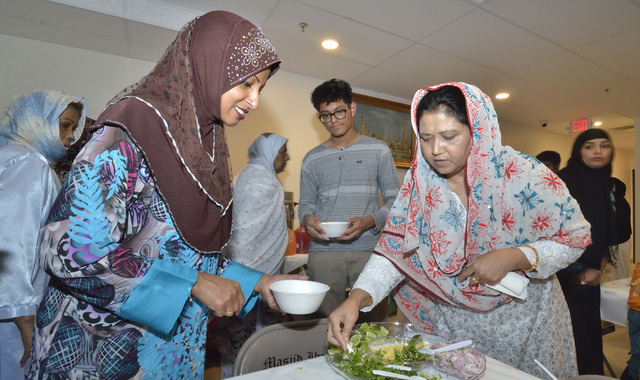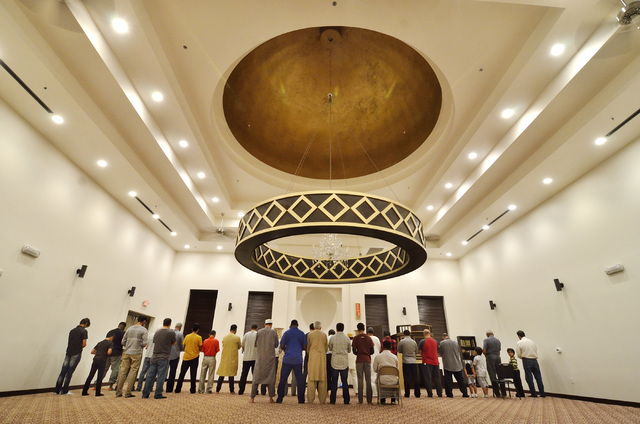Fasting and prayer brings Las Vegas Muslims together for Ramadan
For 29 or 30 days every year, Muslims around the world pray and read from the Quran during Ramadan. From dawn until dusk, they consume no food or drink, not even water.
Muslims frequently gather nightly during Ramadan, which started this year on June 6, to share prayers and break the fast together. On the first Friday of Ramadan, congregants at Masjid Ibrahim, 3788 N. Jones Blvd., filled the mosque’s social hall in anticipation of sunset.
As the sun dipped in the sky, women and men prepared the evening meal.
“It’s a mixed gathering,” congregant Bir Azam explained. “There are people from Afghanistan, people from Arabian countries, people from Bangladesh, Pakistan, and there is food from everywhere.”
Members take turns providing food, preparing it and serving.
Some, such as Tanzima Khan, have professional experience in the kitchen. The chef works in the Lemongrass Thai Restaurant at CityCenter.
“All day I’m cooking, I’m serving, so when I come from work, I come straight here and serve people,” she said.
Khan said being around food while fasting, with the sweet aromas everywhere, doesn’t affect her, even good-natured teasing from co-workers doesn’t get her down.
“You have to have that kind of level to restrict yourself,” she said. “Everybody is eating, and they’re making fun of me saying, ‘Tanzima I’m drinking, mmmm, yum, yum.’ I say, ‘That’s fine. I’ll get more reward because I can abstain from that. You are drinking in front of me. I am thirsty, but I can control myself.’ I can put a barrier up for myself, so it’s not hard for me.”
“We’re not hungry,” congregant Shampa Gallardo said. “It’s kind of mind over matter, if you know you’re not going to eat, you don’t get those hunger pangs. It’s hard to understand. When you know you’re not going to eat and you’re doing it for a different purpose … you really miss the water if anything, it’s not really the food.”
Some followers of Islam are not expected to fast. It isn’t encouraged for pregnant, lactating or even menstruating women, the elderly, young children, people with health conditions or people who work outside in the searing desert sun all day.
But from the time they reach 7, most Muslims are encouraged to participate.
Khan said the fast can be a little harder for Las Vegans in the heat, but it’s still possible.
“You have to mentally prepare, and it’s not that hard,” she said.
She insisted that the fast provides not just religious rewards, but health benefits.
“Your body can detox,” she said. “Your stomach needs to rest. You know 11 months you’re eating some junk food or something. This is the time to detox your stomach. If you have any smoking issues or any alcohol issues, this is the time to start to make your habits go away.”
She added that feeling hungry helps you remember others. An offering for the poor at the climax of Ramadan is encouraged.
“If you’re thinking about feeling hungry, that means you’re thinking a lot of people out there are hungry.”
Aside from cleaning your body, Khan said Ramadan is a time to clean your life.
“Clean up your system, clean up your thoughts. No backbiting, slander, all these things,” she said. She added that while hugs and kisses are OK, sexual intimacy between husbands and wives is not allowed during daylight hours during Ramadan.
As the sun finally set a little before 8 p.m., the fast was broken first with a sip of water followed by dates and plentiful appetizers.
After the breaking of the fast, the congregants were called in for the Maghrib post-sunset prayer, men to the main prayer hall, women to a private chamber with a television broadcasting the prayers in the main hall. Shoes were left outside the door to both prayer rooms and retrieved as the prayers concluded.
Back in the social hall, the full meal was distributed in boxes, each filled with chicken, rice and vegetables.
“We can’t waste anything, that’s one thing,” Gallardo said “It’s very important. We have boxes so they can take things home, but we can’t throw anything away. We really stress no waste.”
In addition to the evening meal, Muslims rise at home before dawn to eat before sunrise prayers.
While the sunrise prayers are private, the evening meal and prayers are a time to connect with the community.
“The only hard thing about it is your family at home,” said Muslim convert Nancy Burciaga. “We come here to build a family and the love we sometimes don’t get at home because they’re not fasting like we are.”
Burciaga chose to follow Islam the first day of Ramadan three years ago. Raised in an Evangelical Christian household, she took baby steps to get where she is now.
“I learned how to pray and learned about the religion,” she said. “I didn’t start wearing my hijab (veil) until like eight months later. Nobody forced me. I just read about it and learned about it and realized it was time for me to wear it. My family thought I was crazy, they said, ‘She’s going through a phase.’”
Explaining the fast to family has also been a challenge.
“My mom keeps telling me, ‘You’re going to get sick. You’re going to get sick,’” Burciaga said. “And I tell her, ‘Mom, Jesus fasted for 40 days.’”
Najma Olaer said she also decided to follow Islam during Ramadan. The father of her children had given her a copy of the Quran.
“It took me one year before I opened up that book,” she said. As she read, she said she found the explanations she need.
“I thought, this is what I was looking for,” she said.
Before long, she was committed. She marched into the nearest mosque, not even knowing it was Ramadan.
“I didn’t have a hijab, I just went,” she said.
After the evening meal, congregants were called in again at about 9:30 p.m. for the Isha evening prayer and the Taraweeh, an extra prayer unique to Ramadan that contains passages from the Quran. The Taraweeh progresses through the Quran over the month with completion as a goal. The mosque broadcasts the Taraweeh live online throughout Ramadan (themasjidibrahim.com).
Ramadan is continues through July 5. Dr. Aslam Abdullah, director of Masjid Ibrahim, said the odd days during the last 10 days of Ramadan are considered especially sacred.
“And one of the nights is designated as the Night of Power where the blessings of God become boundless,” he said.
The event commemorates the night the Quran was revealed to the prophet Muhammad. This year, it is set to be marked July 2.
Prior to that, Masjid Ibrahim is scheduled to host a private dinner for the interfaith community on June 30.



